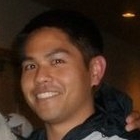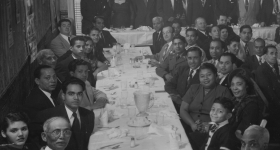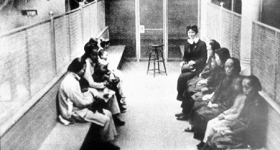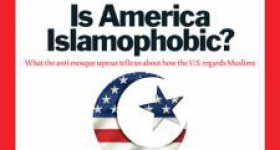Dr. S.B. Woo
During
the 2008 Presidential Election, the Huffington Post dubbed the 80-20 Initiative as the nation’s “largest
Asian American PAC,” describing the group as a non-partisan
organization that represents the AAPI community's “interests as a whole.”
But while
members of the organization boast a political success unrivaled by other AAPI
groups, critics refer to them as an exclusive organization that is out of touch
with the broader AAPI community.
“Any
claim of 80-20’s, that it represents the Asian American community, is
ludicrous,” Paul
Watanabe, Director of the Institute of Asian American Studies at UMass
Boston, said. “I would say the vast majority of rank and file Asian
Americans do not know a great deal about 80-20.”
As the
brainchild of Dr. Shien Biau Woo, the 80-20 Initiative was
established in the fall of 1998 as the unlikely spawn of the “Chinagate”
campaign controversy of 1996.
A former
Lt. Governor of Delaware, Woo was outraged when Justice
Department investigations uncovered evidence that “agents” of China
contributed direct funds to the Democratic National Committee,
violating U.S.
laws regarding foreign political contributions.
“I
thought, this is so un-American,” Woo recalled. “The news media in the U.S.
took it as if the entire Asian American community was engaging in a cabal to
undermine the U.S. election system.”
Woo said
he met with several AAPI academic leaders, including Dr. Larry Y. Ho, Professor
at Harvard University, and the late Dr. Chang-Lin Tien, chancellor of the University of California, Berkeley, and
decided to combat the negative media sensationalism by forming a group bent on
uniting the AAPI community as a political force.
They
compiled a list of 300 individuals, largely Chinese Americans, who would then
donate close to $50,000 to their cause, funding the birth of 80-20.
The
group, which consists of an Educational Foundation coordinated by Woo, and a
PAC led by Coordinator of Collective Leadership, Ved Chaudhary, has since
sought to gain “political clout” by attempting to mobilize 80 percent of the
AAPI community to vote for candidates the group endorses, thereby creating a
“swing bloc vote.”
The group
says its purpose is to create equal opportunities for the AAPI community, and
claims to have 3,600 dues-paying members and an email listserv of over 700,000
AAPI voters.
“Our
strength is in our mass emails,” Chaudhary said. “It has helped us double
our membership within the past year.”
While the
group has the ability to reach their base of supporters with the click of a
mouse, the executive director of APIA Vote, Christine Chen, said it takes more than
just emails to break the glass ceiling, criticizing the group for its lack of
hands-on work in the field.
“80-20 is
more focused on the national level, and they don’t do too much in educating the
community on the candidates,” Chen said. “They do a lot more emails then actual
engagement.”
Responding
to this claim, Woo said, “We get things done whether we use snail mail or
email. What difference does it make? It’s the result that counts.”
The organization
posts its success stories online, dedicating them to
their supporters. But while these accomplishments include wins on the electoral
and judiciary levels, Chen said other AAPI groups that contribute
work to similar achievements are often excluded from the credit they deserve.
“A lot of
the work done on getting Asian American judges
appointed has been done by the Asian American Justice Center (AAJC), and
the National Asian Pacific American Bar Association (NAPABA),” Chen
said. “They’re the ones who actually contacted candidates and flagged
them to the White House.’
Toward
the issue of giving due credit, Woo said his organization focuses on the things
that they do, and not what other groups do.
“Are they
waiting for us to tell them about what they do?” Woo said. “We have political
clout and we’ve built it over 12 years brick by brick…People who have little
influence are jealous of others that do.”
While
80-20 has a record for asserting their political pull within different levels
of government, Vincent
Eng, Chief lobbyist of the VENG Group, which
advocates for AAPI groups in D.C., said 80-20’s influence on the Hill is
non-existent.
“In none
of my meetings have I heard any senator or staffer that has asked, ‘What is
80-20’s stance on this issue?’” Eng said. “People in Washington D.C.,
they don’t see [Dr. Woo] or 80-20 represented in the coalitions and work done
on the Hill.”
Eng
admits that the group’s influence may come from their fundraising, but
questions how their money is spent.
80-20
Nominations Chair and former Treasurer, Jing-Li Yu, explains the group’s
budget.
“Our
budget is not that large,” Yu said. “Most of the money is used on
internal purposes, it’s used to pay for the Internet line which is around
$550/month, and the staff salary is usually more than $50,000/year.
Yu said
most of their funds are from annual membership dues ranging from $35 to
$5,000. The organization’s yearly budget can be found in Federal Election
Commission (FEC) filings.
During
off-election years a majority of expenditures go to administrative costs,
salary for 1 to 2 paid staff, and consultant fees. Election years call
for an increase in political contributions and electoral expenses. The
PAC pays for advertisements in battleground states. In 2008, they spent
close to $30,000 for Democratic presidential candidates Hillary Clinton and
Barack Obama.
With
average funds ranging between $100,000 and $200,000 a year, 80-20 is no Super PAC, and most likely does not
gain its political influence monetarily, or through collaboration, according to
Eng.
Eng said
AAPI groups like NAPABA and the AAJC have worked together on various AAPI
issues, and have never worked with 80-20, which comes off as a group distant
and unwilling to collaborate, a claim that Chaudhary said is completely false.
“No
organization has come to us and said let’s work together,” Chaudhary said.
“We very much want to work with other Asian American organizations.
We don’t want to set ourselves apart unless we have to.”
Setting
themselves apart during the 2008 presidential primary, the group’s PAC created
waves within the AAPI community for running attack ads against
Obama for supposedly refusing to answer their candidate questionnaire.
After
consulting their bylaws and endorsement committee, the PAC
eventually endorsed Clinton, who was the only candidate to complete the
questionnaire. The group then ran a campaign to defeat Obama, who was
only one of several candidates who did not complete the group’s questionnaire.
While
Obama would eventually answer the questionnaire, and the group would also
endorse the future president during the general election, critics in the AAPI
community flooded online message boards, distancing themselves from the group
that claimed to represent them.
One vocal
critic of the group was an AsianWeek reader
who went by the name of “Mai Kou
Xiong.”
Don’t pretend to “represent” any of us, if you’re an
organization that can’t even sense that your current actions as an organization
might actually be hurting so many Asian Americans.
While Woo
has proclaimed 80-20 as
“the most powerful organization” in the AAPI community, boasting that the group
could reach “55 percent of Asian Americans in eight hours,” other AAPI’s find
the group’s objective to be “ludicrous.”
“In the
U.S. there are about 14 million people that call themselves Asian American,”
Watanabe said. “Without any systematic discussion, effort, or survey of a
representative sample of those 14 million Asian Americans, it would be
ludicrous for any group, including 80-20, to represent that group of people.”
Woo
denies ever claiming the group represented 80 percent of the AAPI community.
But currently their Educational Foundation is working on the Fisher v. University of Texas Supreme
Court case, and will file an amicus curiae legal
brief with the Supreme Court on May 29, asserting their representation of the
AAPI community.
Classified
as a 501c3, the
foundation does not endorse or oppose any political candidates, but has taken a
controversial stance, siding with Fisher. The foundation essentially favors the
overturning of Grutter v. Bollinger, which could end
affirmative action policy admissions at U.S. public universities.
Woo said
the foundation’s decision was influenced by a survey
completed by over 45,000 AAPIs who were asked whether they were for or against
Fisher.
“The ultimate
result was about 98 percent of all Asian Americans were for a race neutral
merit based admissions system,” Woo said.
It has
not yet been determined if the survey was pan-generational, but 80-20 board
member Alice Huang admits that the members of the organization “are obviously
pretty old.”
Huang was
one of the 2 percent who voted against Fisher.
“I worked
at a university and I saw that if we had a class that is 80 percent Asian, it
was not going to be a great experience for a large amount of students
attending,” Huang said.
For those
AAPIs opposing 80-20’s stance on the case, Woo has some choice words.
“We are
fighting for a race neutral policy and [Stewart
Kwoh] in the past has supported several Supreme Court cases for a race
conscious admissions policy, which I think grossly discriminates Asian American
college applicants,” Woo said.
Kwoh is
the President of the Asian Pacific American Legal Center (APALC), and is
an AAPI civil rights leader who plans to submit a second brief in support of
the University of Texas. The 80-20 foundation has included Kwoh in their
May 14 BlogSpot,
pressing him to “be accountable” to the AAPI community.
“We ask
him to not file it this time. He can file it as an individual, but don’t claim
to represent the Asian American community,” Woo said.
Kwoh says
the APALC is committed to diversity and anti-discriminatory programs in higher
education, and that they are for a holistic approach to college admissions
policies.
“When we
look at the education system it isn’t a balanced playing field when so many
schools in minority communities have poor access to college bound programs,”
Kwoh said. “Most presidents would not have gone to their schools if you
just looked at test scores and grades. So we think it is important to
look at the whole student, when educating the best minds and leaders in our
country.”
Referring
to 80-20’s stance on the case, Kwoh and the APALC respectfully disagrees, but
hopes for future collaboration with any AAPI group that is willing to work with
them.
“Although
we may disagree with 80-20 on this case, I do think they have a reach into
different parts of the Asian American community, so I respect S.B [Woo] and
their group,” Kwoh said. “I am not as familiar with what they claim to
have accomplished, but we are always welcome to working with other Asian
Americans on issues we agree or disagree on.”
While
criticisms of the 80-20 initiative are valid, it is hard to know if their
critics have actually taken the time to talk with the group.
Although
80-20 may come off to some as enigmatic and retrograde, the organization as a
whole has accomplished a lot throughout the years, and Woo seems to have a
knack for controversy that gives 80-20 an edge, that other groups lack.
“We gotta
work together past the differences,” Woo said. “... But you can’t make a
positive contribution unless you’re willing to risk your neck a little.”










Comments